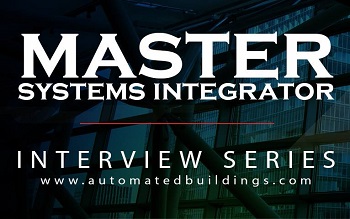 EMAIL
INTERVIEW
– Scott Cochrane and Colin Murray
EMAIL
INTERVIEW
– Scott Cochrane and Colin Murray|
April 2018 |
[an error occurred while processing this directive] |
| |
 EMAIL
INTERVIEW
– Scott Cochrane and Colin Murray
EMAIL
INTERVIEW
– Scott Cochrane and Colin Murray
Scott Cochrane is President and CEO of Cochrane Supply & Engineering, a leading industrial IoT and building controls supplier with locations throughout Michigan, Ohio, and Kentucky, as well as one in Canada. In 2000, Scott took over the business from his father, Donald Cochrane, Sr., who founded the company 50 years ago. He is proud to be an advisory council member for multiple industry manufacturers such as Honeywell, Johnson Controls, and Tridium, and to be named a 2016 IBcon Digital Impact Award Winner for his innovative contributions to the industry.
Colin M. Murray is the owner of Solution
Control Services,
a sole proprietorship offering a wide range of services from the
control of commercial HVAC systems to industrial automation.
Projects range from prototype and testing machines, control panels for
custom HVAC manufacturers, industrial safety and motion control, full
building and real estate portfolio integration, and user interface and
graphics development on multiple platforms. Products supported include
Tridium products from Vykon, Johnson Controls, Phoenix Contact,
Honeywell, KMC, Johnson Controls Metasys (including all current and
legacy platforms), GE Cimplicity, iFix and Intellusion, Rockwell
Automation (all Logix Platforms), Factorytalk Studio, and Connected
Components Workbench. Services also include configuring and
installing user workstations, servers, and web supervisors.
Virtualization is provided with either VMWare ESXi Hypervisor or
Workstation. Solution Control Services is a Dell EMC Partner.

| Articles |
| Interviews |
| Releases |
| New Products |
| Reviews |
| [an error occurred while processing this directive] |
| Editorial |
| Events |
| Sponsors |
| Site Search |
| Newsletters |
| [an error occurred while processing this directive] |
| Archives |
| Past Issues |
| Home |
| Editors |
| eDucation |
| [an error occurred while processing this directive] |
| Training |
| Links |
| Software |
| Subscribe |
| [an error occurred while processing this directive] |
Scott Cochrane of Cochrane Supply & Engineering has the unique benefit of working with 300+ of the best systems integrators in the country. Cochrane recognizes the critical role they have within the building automation industry and is speaking with a different highly-regarded MSI each month with the goal of providing examples of industry trends, best business practices, and the growing value of an MSI. This month, he interviews Colin M. Murray the owner of Solution Control Services
February Interview with Jeff Murphy, President and CEO of ECT Services, Inc.
January Interview with Chris Saltz, Managing Principal of FIX Consulting LLC.
December Interview with Jason Houck from Hepta Control Systems.
November Interview with Geoff Hunter, President and Senior Principal of Palmer Conservation Consulting (PCC)
October Interview with Brian Oswald, Managing Director for CBRE | ESI.
September
Interview with Joe
Napieralski the Co-Founder and Director of Development of Smart
Building Services LLC
August Interview with Sidney
H. Blomberg, Jr. the founder and President of K
& S Ventures, Inc
July Interview with Scott
Cochrane and Ken Sinclair
This month he interviews Colin M. Murray, Owner of Solution Control Services
Cochrane: How did you
become an MSI?
Murray: Being an integrator began for me in the trades or
maybe before with my Commodore VIC-20. I trained in Canada to be
a refrigeration mechanic servicing the petrochemical industry and have
worked in the field for all 27 years of my career. During that
time, I began to understand the important relationship between
automation, integration and complex mechanical systems. As
automation became more prevalent, my work and interest were drawn more
towards controls and integration. I became a service manager for a
commercial HVAC company in 1995. From there I moved into larger
contracting houses to gain more exposure to newer technologies. In
2003, I launched my own business with a focus on custom applications
and supporting mechanical contractors who did not want to employ a
full-time controls staff.
Over the course of the last 15 years, I’ve had the opportunity to:
develop controls for OEMs, build prototype machines for companies
including Detroit Diesel and GM, and travel internationally to work on
a wide variety of systems. This exposure not only provided rich
and challenging experiences but offered a template to meet the most
rigorous of customer expectations. Seeing the work of highly
accomplished tradespeople, programmers and engineers across many
disciplines forced me to reevaluate my standards and strive always to
make each job an improvement on the last.
Cochrane: Can you
explain what some of the characteristics are of a good MSI?
[an error occurred while processing this directive]Murray:
An
MSI must have a fundamental understanding of systems being
controlled. This is necessary to ensure that integrators can
validate information and correctly visualize systems. An understanding
of both current and legacy control systems and communications protocols
is also necessary. Most importantly, a willingness to learn and
persist until a resolution is found is essential for an MSI. You must
be willing to dig for answers as they don’t usually present themselves
at the outset of an issue.
Cochrane: How do you
sell Master Systems Integration services?
Murray: I have had the good fortune of having all my job
opportunities referred through colleagues, customers, and vendors.
Cochrane: How do your
customers procure MSI services?
Murray: My customers tend to be contractors or end users
who have been referred to me by their mechanical contractor.
Cochrane: As an MSI,
what percent of your time is spent in the following categories?
R&D, Consultations, Field Commissioning, and Software Programming.
Murray:
R&D: 10-15% (But we’re always reading and learning about new
advancements.)
Consultation: 20-25%
Software Programming: 20-25%
Field Commissioning: 40-50%
Cochrane: Describe a
few challenges that you’ve encountered as an MSI.
Murray: I think that being an integrator is all about
overcoming challenges in an industry that is constantly growing and
changing. The most common challenges include ever-increasing
security constraints, browser, and platform compatibility issues,
product anomalies from hardware issues to software glitches, and trying
to keep pace with current user interface standards made popular in
mass-market apps. These challenges are compounded by the goal of
Internet-inclusiveness and the tsunami of information and standards
that flow with it. The challenge is to stay afloat and not get
swept away or be overcome.
Cochrane: Do you
envision Master Systems Integration being a part of your business in
the future? If so, how?
Murray: Yes. This industry and many others are
pushing
to integrate systems, visualize data and improve the user’s experience
through better notification, easier access, improved efficiency and
system reliability. The expectation for systems to be integrated
and intelligent is growing, and these systems can only be developed by
experienced practitioners willing to collaborate and share their skills.
[an error occurred while processing this directive] [Home Page] [The
Automator] [About] [Subscribe
] [Contact
Us]
[Click Banner To Learn More]